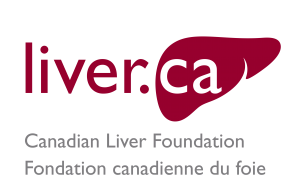Stroller Spotlight – Little Warrior
Stroller Spotlight - Little Warrior: Lillian, Arlene and Tony Bhathal
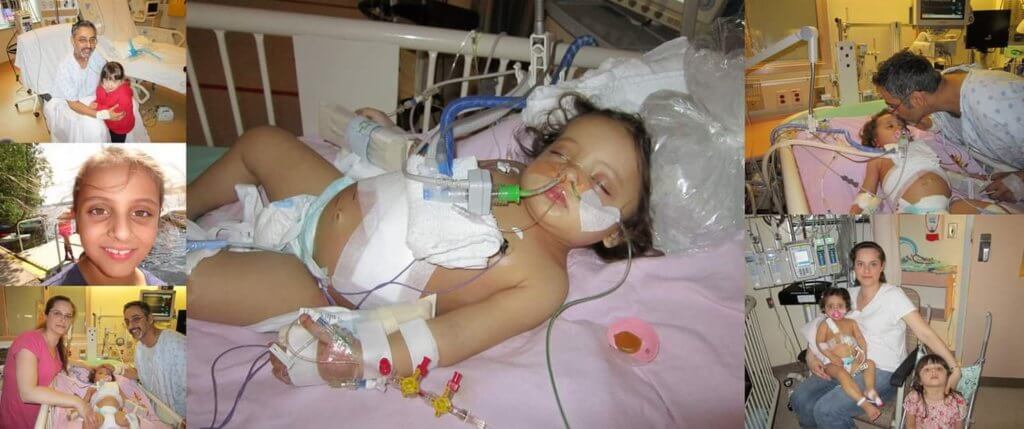
On November 8, 2010, Arlene and Tony Bhathal welcomed their second child, Lillian.
Three weeks postpartum, Lillian’s eyes began to turn yellow and after a visit to the clinic, the pediatrician determined that she was likely suffering from breast milk jaundice. Arlene and Tony immediately switched Lillian over to formula, and scheduled a follow up appointment two weeks later.
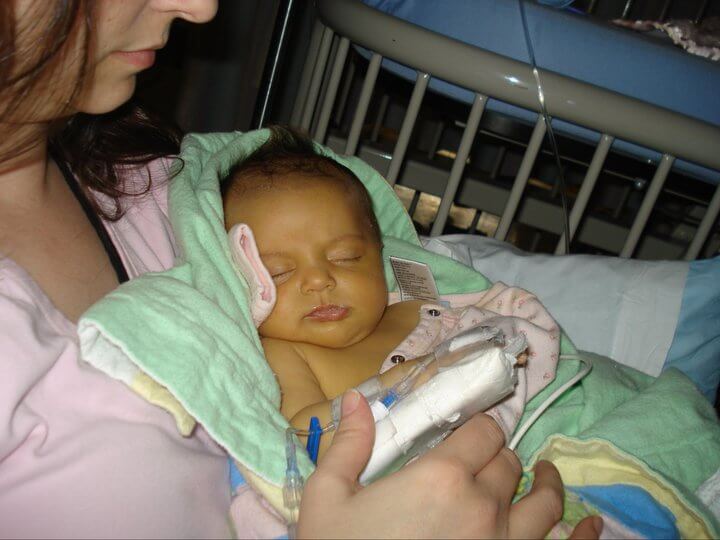 During their follow up appointment, the pediatrician did a series of tests and discovered that Lillian’s liver wasn’t in the right place and was firmer than usual. They were immediately sent to the Children’s Hospital in Eastern Ontario (CHEO), in Ottawa, for tests, and phototherapy treatment. But after eight hours under the light, there were no changes. Lillian was admitted to CHEO and underwent what seemed like an endless series of needles, tests, scans, MRIs and ultrasounds.
During their follow up appointment, the pediatrician did a series of tests and discovered that Lillian’s liver wasn’t in the right place and was firmer than usual. They were immediately sent to the Children’s Hospital in Eastern Ontario (CHEO), in Ottawa, for tests, and phototherapy treatment. But after eight hours under the light, there were no changes. Lillian was admitted to CHEO and underwent what seemed like an endless series of needles, tests, scans, MRIs and ultrasounds.
At six weeks old, Lillian was diagnosed with biliary atresia, a relatively rare disease that begins in early infancy and affects about one in every 10,000 to 20,000 infants. Lillian was immediately prepared for her first major surgery, called a kasai procedure, where damaged bile ducts from outside the liver are removed and the small intestine is attached to the liver, providing a path that allows bile to drain from the liver.
Lillian underwent her surgery on New Year’s Eve, 2010.
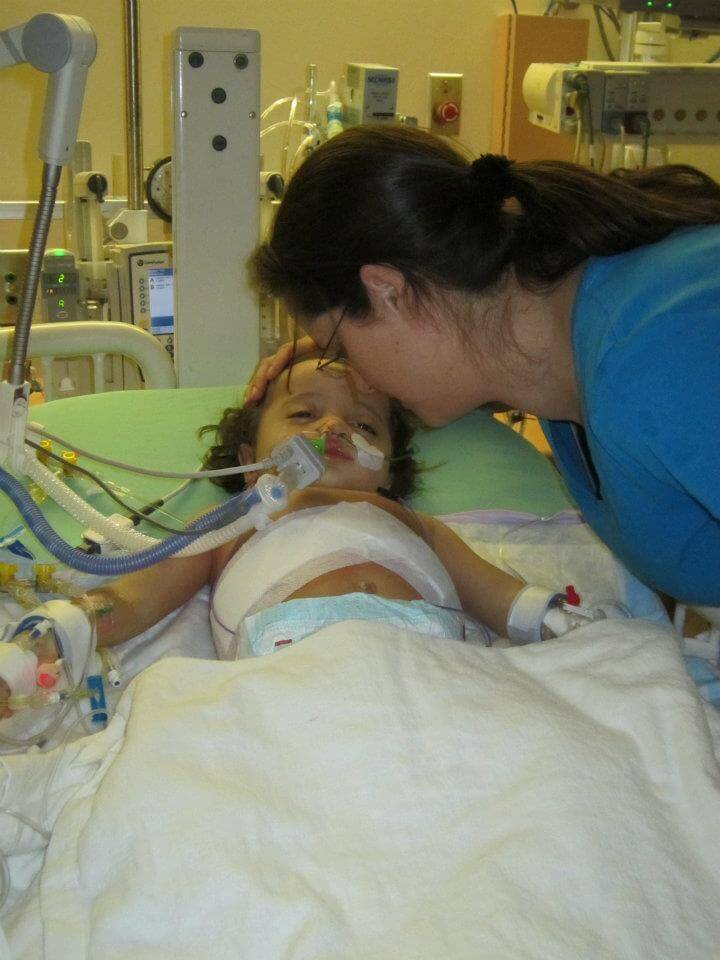 After three days in the ICU, and a month in the hospital waiting for the fluids to drain from her liver, finally bringing Lillian home was a relief for Arlene and Tony, but it was also an incredible challenge for the family. Lillian was endlessly hungry, eating six to eight bottles a night, and going through more than 15 diapers a day. But her hunger was matched by her exhaustion, often falling asleep in the middle of feeds, only to wake up again minutes later, just as hungry. She also suffered from severe nose bleeds and ascites (a condition where fluid builds up in the belly), a side effect of biliary atresia.
After three days in the ICU, and a month in the hospital waiting for the fluids to drain from her liver, finally bringing Lillian home was a relief for Arlene and Tony, but it was also an incredible challenge for the family. Lillian was endlessly hungry, eating six to eight bottles a night, and going through more than 15 diapers a day. But her hunger was matched by her exhaustion, often falling asleep in the middle of feeds, only to wake up again minutes later, just as hungry. She also suffered from severe nose bleeds and ascites (a condition where fluid builds up in the belly), a side effect of biliary atresia.
Lillian’s medications were also overwhelming – following her kasai procedure, she was taking around five different medications, a couple of times a day. A few months later, she was on 18 medications, 20 times a day.
At nine months old, Arlene and Tony were told that their daughter’s liver was failing – Lillian was put on a liver transplant list. Her family immediately began testing to see if they were a match for a live liver donation. To their relief, Tony was a match.
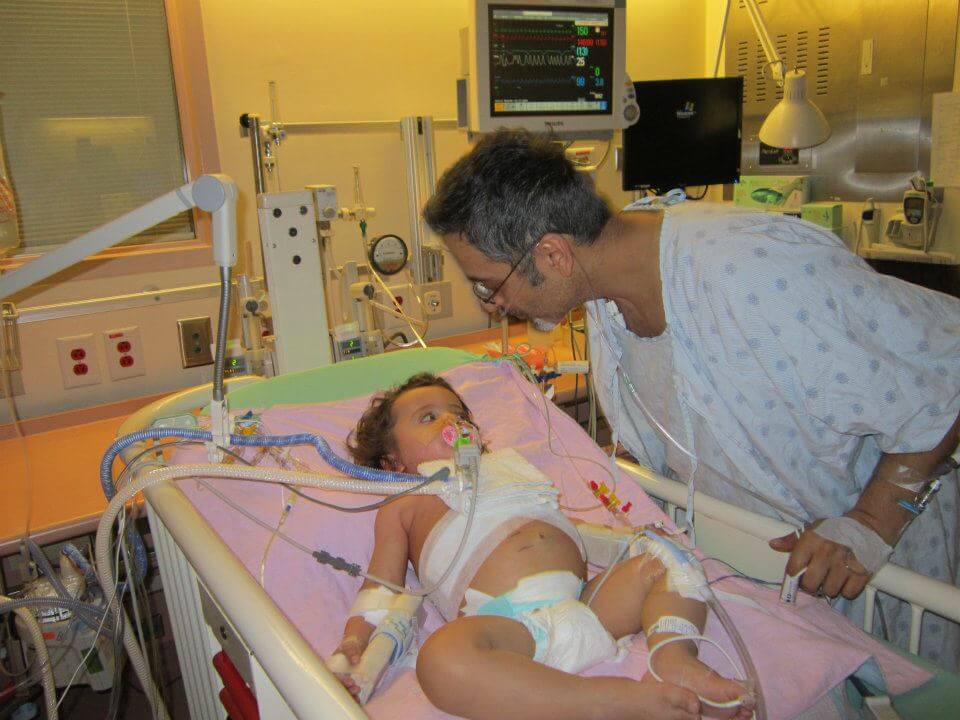 To prepare for the transplant surgery, Tony got himself into optimal shape – he lost 50 pounds, went for bi-weekly blood work, and eventually, they received a date for the transplant, at the Hospital for Sick Children (SickKids) in Toronto. But just 15 hours before the surgery, the surgeon reviewed Lillian’s case and based on her numbers and current state, believed that she was not in immediate need of the transplant, and cancelled the surgery. The family was confused and upset – after months of physical, mental and emotional preparation, canceling the surgery was incredibly frustrating.
To prepare for the transplant surgery, Tony got himself into optimal shape – he lost 50 pounds, went for bi-weekly blood work, and eventually, they received a date for the transplant, at the Hospital for Sick Children (SickKids) in Toronto. But just 15 hours before the surgery, the surgeon reviewed Lillian’s case and based on her numbers and current state, believed that she was not in immediate need of the transplant, and cancelled the surgery. The family was confused and upset – after months of physical, mental and emotional preparation, canceling the surgery was incredibly frustrating.
Not long after, back at CHEO, Lillian’s team discovered new concerns – varices in her esophagus – and was sent back to Sick Kids to treat them. When they arrived, the surgeon was unable to treat them – she was just too small for the necessary procedure to work. Upon review of her history and current state, including the ascites that had not subsided, a new surgeon took up Lillian’s case and pushed for her to undergo transplant surgery immediately.
And at 16 months, Lillian received a portion of her father’s liver.
 Within five days, Tony recovered enough to be released from hospital, and Lillian followed suit just thirteen days after her dad.
Within five days, Tony recovered enough to be released from hospital, and Lillian followed suit just thirteen days after her dad.
Now 10 years old, Lillian’s journey continues to be challenging – a number of liver-related, and unrelated health concerns, endless tests and blood work – but her liver disease hasn’t slowed her down. She loves soccer, camping, hiking, swimming, just to name a few.
“She’s so strong – she’s a warrior,” said Arlene. “Even when she was at her worst healthwise, the whole time she was so happy and spunky. If she wasn’t in pain and crying, she would be smiling. She was so happy even though she was in so much pain.”
The Bhathal family is grateful to the medical teams that have, and continue to, support Lillian’s health journey, and it’s because of this that they take part in the Canadian Liver Foundation’s Stroll for Liver. Since 2013, they have joined up with five families in their neighbourhood, raising funds for the Canadian Liver Foundation.
From door-to-door canvassing to lemonade stands and selling homemade bookmarks, necklaces and cookies – the community rallies around the Bhathals to help support their Stroll campaign.
 “We need to keep funding important research,” said Tony. “Biliary atresia has no known cause, and no cure – we need science and research to keep working, and hopefully change that one day.”
“We need to keep funding important research,” said Tony. “Biliary atresia has no known cause, and no cure – we need science and research to keep working, and hopefully change that one day.”
“We also do it for education and awareness,” said Arlene. “Early detection is a matter of life or death for a child born with biliary atresia. Parents and pediatricians all need to be educated on the signs – we need the knowledge so that no more lives are lost unnecessarily.”
